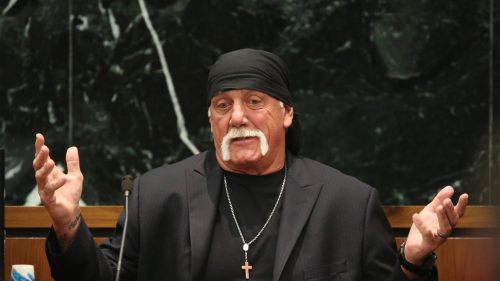RED SPARROW Film Review: Puzzles Of Desire
For years, David Cronenberg's filmography has wrestled with questions of identity, the notion of what makes an individual so, even if they're seemingly hiding in another's skin. After Cronenberg finished crafting his infamous "body horror" during the mid-'80s, he jettisoned the "goop" that dominated such masterworks as The Fly, yet the same philosophical interrogations remained. As our own Phil Nobile Jr. once put it when writing about the Canadian auteur’s icky form-morphing swan song:
"If a mob hit man reinvents himself as a small-town coffee shop owner, and lives that life for enough years (A History Of Violence), is he still a mob hit man inside? To what degree is he defined by the external vs. the internal? If a cop pretends to be a Russian gangster, lives as a Russian gangster and does the things a Russian gangster does (Eastern Promises), isn’t that in fact what he is? If I pretend to be someone long enough, who’s to say I can’t, eventually, really become that person?"
While Red Sparrow - superstar actress Jennifer Lawrence's reteaming with her former Hunger Games franchise director Francis Lawrence - doesn't have Cronenberg's name anywhere in the credits, it still feels soulfully linked to the legendary filmmaker’s output. Following the exploits of a former ballerina turned Soviet spy, this adaptation of denied-area CIA Ops expert Jason Matthews' first entry into the "Sparrow Trilogy" is an ice cold procedural, where bodies become little more than tools for the state, in a flesh for secrets game that leaves everyone who plays physically and spiritually damaged. Red Sparrow is about the sacrifice of personal definition in service of country, and how one woman discovers that she may be her masters' greatest asset of all. But if one is content to merely become what her superiors demand, is she still the same person, or even capable of being empowered by her actions?
Dominika Egorova's (Lawrence) journey into post-Cold War spy tactics even begins with a bodily disfiguration, as the Bolshoi Company member's leg is tragically broken onstage in an accident, the crowd recoiling in disgust at the mangled limb her co-star accidentally pounced on (or was it an accident?). Three months and multiple steel pins later, the art Dominika loves is a distant memory, as she struggles to figure out how she's going to keep her ailing mother (Joely Richardson) cared for, not to mention a roof over their heads. But her Uncle Vanya (Matthias Schoenaerts) - an Intelligence and Security Officer for Mother Russia - offers her a way to achieve both: perform a simple operation involving a state target, where she'll swap his phone out for a dummy. Trouble is, the mark rapes her in his hotel room, just before an assassin (Sebastian Hülk) enters through the window and cuts his throat.
Now, Dominika finds herself caught in a conundrum, and her Uncle’s superiors - General Korchnoi (Jeremy Irons) and Deputy Zakharov (Ciarán Hinds) - think the girl should be treated as a "loose end" and terminated immediately. However, Vanya proposes that Dominika be entered into the Defense Ministry's "Red Sparrow" program, where she'll be trained in the art of seduction in order to obtain secrets from Russia’s enemies. Dominkia has no choice in the matter (essentially: die or spy) and is carted off to a "school" in the middle of nowhere, where she trains with a class of fellow fine-looking men and women. Their Matron (Charlotte Rampling) instructs them on how to become unfeeling solutions to their vectors' "puzzles of desire". You see, according to the Sparrow school of thought, every human is simply a riddle to be solved - a complex ball of hidden sexual wants that are the key to obtaining anything an infiltrator needs to complete their mission. The external body is exploited to get at internal data, all while these extractors suppress their true identities.
While the promotions for Red Sparrow are essentially selling audiences a non-MCU Black Widow spin-off, Team Lawrence have instead committed to something far more sinister (that probably won't sit well with many audience members). The cruel tutelage of the Sparrow Matron includes numerous instances of sexual violence and degradation, as in-between lock-picking workshops, certain students are even asked to give up their own gender identification to complete their lessons. When a degenerate target who craves the company of young boys is presented before the pupils, one girl is called to the front and told to "be a boy, then" when she protests about having to gratify him to earn the day's set of secrets. Later, Dominika is attacked in the showers, and subsequently must perform with her attempted rapist in front of their peers, a crass exploration of what the act of violence meant to its perpetrator. The result is a Verhoeven-esque analysis of sexual power dynamics, confrontational in its depiction of government sanctioned carnal strategizing.
Unlike his past work - which was geared toward tentpole spectacle (Constantine, I Am Legend) - Francis Lawrence is rather restrained and distant while shooting Red Sparrow. Working with his Hunger Games cinematographer Jo Willems, the director exploits numerous Eastern European locations, using the Old-World architecture to dwarf Jennifer Lawrence as she navigates a mission to manipulate CIA agent Nate Nash (Joel Edgerton), which leads to a series of double-crosses and espionage riddles. Willems’ frame is usually wide and looming, as if never wanting us to get too close to these icy operatives, a rejection of intimacy that runs through to the characters' cores. It's a rather remarkable work of “adult thriller” aesthetics, inviting us into a universe where Russia’s never truly moved past its Reagan-era competition for classified info with the United States.
Unfortunately, the extended second act is where Red Sparrow starts to sag, as it leans into becoming more of a traditional spy procedural. Beyond pinning Nash, Dominika must keep her pig of a boss (Douglas Hodge) in check, as he's always looking to get rid of the girls who won't give it up to him. An alignment with the CIA Agent to entrap a Senator's Chief of Staff (Mary-Louise Parker) attempting to sell American intel becomes much more complicated by Agency leadership - the gruff Marty Gable (Bill Camp) and suspicious Trish Forsyth (Sakina Jaffrey) - leading to a series of convoluted flip-flops of loyalty that become somewhat confusing. To be fair, the entire plot seems to be lifted from the John le Carré playbook - complete with a rather satisfying nod to Tinker Tailor Soldier Spy during the climax - but the mechanics often feel like just that: gears grinding after the utterly spectacular first hour breezes by in a gust of sweaty perversion.
Those seeking out more action from the tried and tested team may be disappointed, though when violence does erupt, it's rather brutal and shocking. There are several scenes of torture, as both Dominika and other operatives are beaten within an inch of their lives. In one scenario, the skin is literally peeled from a character's back; another instance of Cronenbergian imagery that again reminds us these flesh suits are little more than disposable units within a system of ruthless execution. A third act knife fight is reminiscent of Hitchcock's Torn Curtain, as every puncture wound is felt in the audience's own guts - phantom stabs that make us squirm in our seats. Much like the sexuality, the bloodletting would feel clinical if Lawrence didn't seem so intent on rubbing our noses in the ugliest aspects of the spy trade. This isn't James Bond; it's Zero Dark Thirty with a voyeuristic mean streak.
Perhaps the most confounding puzzle of all is Dominika herself, whose own desires are often difficult to decode beyond her basic need to care for her mother, and a general distrust of Uncle Vanya (whose impure affection for the dancer has been brewing "since she was a girl"). As much as Red Sparrow is a thrilling, visceral espionage drama, it's also an examination of how one woman decides to hide her own wants in order to act in accordance with many masters' wishes simultaneously. This can often make the spy seem impenetrable, with Lawrence's porcelain doll features conveying little in terms of genuine emotion. It's a daring, perplexing performance, perhaps the bravest of the young actresses’ career. By the end, we're never sure which direction this bird wants to fly, or why. Only her orders become the guiding force in a world dominated by men who think they can own her body outright. Just like the assassins and mob bosses in Cronenberg's work, she's a vessel for a soul that may have morphed beyond its original form, becoming an entity she arguably no longer recognizes herself.



